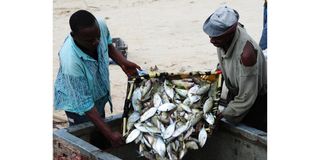BUDGET 2025/26: How tourism and fisheries industries can create jobs

From the fisheries sector, stakeholders are calling for a budget that empowers youth and modernises the country’s fisheries economy. Photo | Courtesy of WWF
What you need to know:
- From the tourism sector, the Tanzania Association of Tour Operators (TATO) has raised red flags over unpredictable levies and inadequate infrastructure that hinder the industry’s growth.
Dar es Salaam. As the government tables the 2025/26 national budget in Parliament this week, key private sector stakeholders from Tanzania’s tourism and fisheries industries have called for a budget that eases operational burdens, strengthens infrastructure, and prioritizes inclusive economic growth.
From the tourism sector, the Tanzania Association of Tour Operators (TATO) has raised red flags over unpredictable levies and inadequate infrastructure that hinder the industry’s growth.
TATO Chairman Wilbard Chambulo urged the government to avoid introducing new levies without consultation, describing such moves as disruptive and damaging to investor confidence. “We’re asking for a fair, stable, and facilitative environment to do business,” said Mr Chambulo.
“Let the private sector lead in driving tourism growth, while government focuses on enabling infrastructure and predictable regulations.” He noted that many tour operators face difficulties due to unpredictable and fragmented levies imposed by various government ministries, departments, and district councils.
Mr Chambulo proposed that the government streamline collections under a unified payment window to simplify compliance and improve efficiency.
“We’re asking for one window to pay all government and local authority dues at once. That way, entrepreneurs can focus on sales, production, and expansion,” he added.
TATO is also urging the government to maintain the current tax framework without imposing additional fees that could deter investment and increase the cost of doing business in a highly competitive global tourism market.
On international promotion, TATO maintains that the private sector should take the lead in marketing Tanzania, with government support through clear policy, trade diplomacy, and global branding partnerships.
Meanwhile, from the fisheries sector, the Tanzania Women Fisheries Workers Association (Tawofa) and the Tanzania Fisheries Association (Tafu) are calling for a budget that empowers youth and modernises the country’s fisheries economy.
Speaking to The Citizen, Tawofa Assistant Secretary General Fatuma Katulla said youth-led cooperatives need access to affordable loans and subsidies to replace outdated gear with safer, sustainable fishing vessels.
“The lack of cold storage, modern jetties, and processing facilities causes massive post-harvest losses,” she said. “This budget should unlock investment in cold chains and offer tax incentives for youth groups involved in value addition, like smoking, drying, and canning fish.”
Tafu assistant secretary general Mayalu Kasiri echoed similar concerns, urging the government to establish a dedicated fund for young fishers, providing patient capital and integrating entrepreneurship and financial literacy training.
“Lake Victoria sustains the economy of the entire Mwanza region. We need funds to protect breeding grounds, just like we invest in forests and wildlife,” he said





